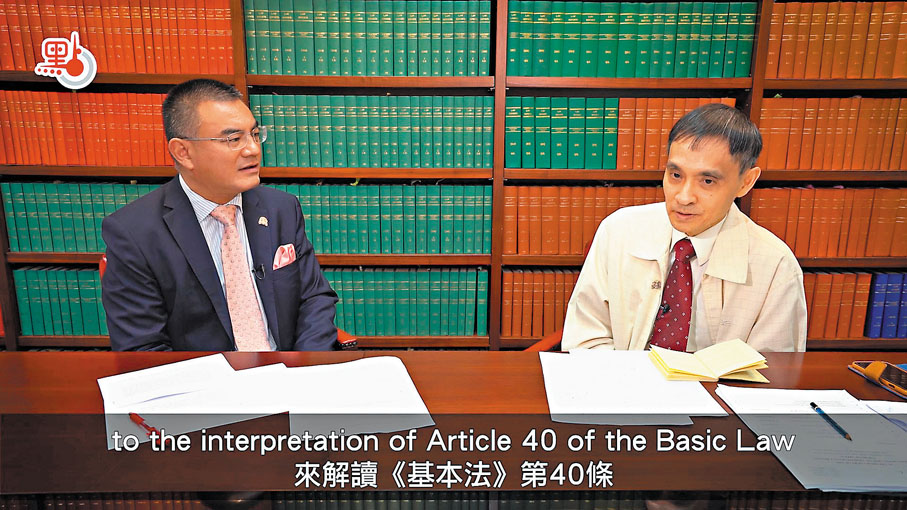【Legal Affairs】原居民建丁屋 傳統權益合法


陳弘毅:基本法頒布時承認原居民合法權益
被譏為「長洲覆核王」的郭卓堅早前入稟香港特區終審法院挑戰丁屋政策,指丁權帶有歧視,不屬基本法第四十條保障的新界原居民傳統合法權益。終院近期頒下判決,駁回郭卓堅的上訴,維持上訴庭的決定,裁定丁權屬「新界原居民合法傳統權益」。針對這一熱題,我們請到全國人大常委會香港基本法委員會委員、香港法學交流基金會的高級顧問、香港大學憲法學教授陳弘毅,就該政策及案件做深入解讀。
主持︰Welcome to the fourth edition of Legal Affairs , I'm Stephen Yap. In the studio this afternoon, we have Professor Albert Chen, who is a senior consultant of the HK Legal Exchange Foundation, and also the National People's Congress HK Basic Law Committee member.
歡迎收看第四期《以法論政》,我是葉欣穎。今天我們有幸邀請到陳弘毅教授,他是香港法學交流基金會的高級顧問,同時也是全國人大常委會香港特別行政區基本法委員會委員
Today we will talk about traditional indigenous rights and Small House Policy. Now people know that male indigenous villagers have a right to build a small house upon New Territories land. Now this right has been around for hundreds of years, and the Basic Law protects and extends this right beyond 1997. Now someone challenges this right in our court.
今天我們將討論原居民的傳統權利以及小型屋宇政策。人們知道,男性原居村民擁有在新界土地上興建小型屋宇的權利,現在這項權利已經存在了幾百年了,基本法保護並延伸了這一權利至1997年以後,然而這項傳統權益在法庭上受到了質疑。
Professor Chen, please could you give us a brief introduction to the traditional indigenous rights, and the Small House Policy.
陳教授,請您給我們簡單介紹一下這項原居民的傳統權益,以及小型屋宇政策。
嘉賓︰This is a very important issue covered by the Basic Law. Article 40 of the Basic Law protects the so-called lawful traditional rights and interests of the indigenous inhabitants of the New Territories. So that provision was drafted and enacted into law in 1990. It was quite controversial at the time, and has remained controversial since then, but no legal challenge has been brought before the court until a few years ago.
這是基本法中一個非常重要的問題。基本法第四十條規定,保護新界原居民的合法的傳統權益,該條款在1990年被起草,並制定為法律,在當時便引起了相當大的爭議,一直到今天也是如此,直到幾年前才有人向法院提出了法律上的質疑。
Now this so-called Small House Policy, in its present form was adopted by the government in 1972. The Colonial Government and its Executive Council adopted this policy. So there are three prongs of this Small House Policy. Number one is free building license, number two is private treaty grant, and number three is land exchange
這個所謂的小型屋宇政策,目前的版本是由當時的政府在1972年採取的,港英政府及其行政會議通過了這項政策。小型屋宇政策主要有三方面的內容,一是通過免費建屋牌照,二是通過私人協約,三是通過土地交換。
主持︰Now it is said that the Small House Policy is discriminatory against two groups of people. First of all, the policy was designed to offer male indigenous villagers exclusively a right to apply for a small house. This totally discriminates against the female indigenous villagers, as they are not allowed to apply for a small house grant. What is your take on that?
有人認為小型屋宇政策是針對兩類人的歧視性政策。首先,該政策旨在給予男性原居村民申請小型屋宇的專有權利,這完全是對女性原居村民的歧視,因為她們不被允許申請小型屋宇補助。你對此有何看法?
嘉賓︰Well, the policy is indeed discriminatory in a technical sense, and it was also recognized by the court. It is discriminatory in a sense that women are not entitled to get the small house grant license. And secondly, it seems to be discriminatory against people who are not indigenous villagers. So even if they live in New Territory villages, if they are not indigenous villagers in a sense defined by law, then they are not entitled to the Small House Policy.
從政策層面上來說,這項政策確實是歧視性的,法院也承認了這一點。從某種意義上說,它具有歧視性的原因是婦女無權獲得小型屋宇補助許可證。其次,它也是對那些非原居村民的歧視,即使他們生活在新界地區的村莊,如果他們不是法律意義上的原居村民,那麼他們就無權享受小型屋宇政策。
So even the court recognized this, and how that there was actually no good justification for the discrimination, so the policy would have been declared unlawful or unconstitutional. But for the provision in Article 40 of the Basic Law seems to sanction this policy, irrespective of whether it is discriminatory against certain people or not.
所以法院也意識到,實際上這種歧視是沒有足夠理由的,因此這項政策會被宣判為非法或者違憲。但是基本法第四十條的規定似乎認可了這項政策,不管它是否歧視某些人。
The Court of Appeal looked at the context of the enactment of Article 40 of the Basic Law, and how that Article 40 was actually intended to protect rights and interests of indigenous inhabitants of the New Territories which were recognized at the time of enactment of the Basic Law, which was the year 1990 recognized by the legal system at that time and the laws at that time as lawful and traditional.
上訴法庭研究了基本法第四十條頒布的背景,以及第四十條的實際目的。保護新界原居民的權利和利益,這些在基本法頒布時已得到承認,也就是在1990年時,是被當時的法律體系和當時的法律所承認的,是合法的、傳統的。
So on this basis, the Court of Appeal held that, at the time the Basic Law was drafted and enacted, the lawful traditional rights and interests of New Territories inhabitants who were indigenous, included already the rights protected or covered by the Small House Policy, so the Court of Appeal upheld the whole of the Small House Policy.
在此基礎上,上訴法院認為在起草和頒布基本法的時候,新界原居民的合法傳統權益已經包括了小型屋宇政策所保護或涵蓋的權利,因此,上訴法院維護了整個小型屋宇政策。
● 點新聞英文節目《Legal Affairs 以法論政》
